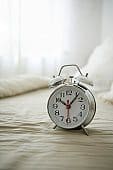
“Our circadian rhythms, or our bodies’ natural clocks, operate on a slightly longer than 24-hour cycle,” says Dr. Robert Oexman, director of the Sleep to Live Institute. “The body clock is used to a little bit of extra time.” Although it takes about a week for our bodies to adjust to the time change in the spring, it takes only one day in the fall.
Turning the clock back has other advantages, as well. As the days shorten, people tend to go to bed earlier than they did when the longer days of summer kept many of us up past our natural bedtimes. And while heart attacks, car accidents, and on-the-job injuries increase after the spring transition, they decrease in the fall, says Oexman, lending credence to the power of sleep.




